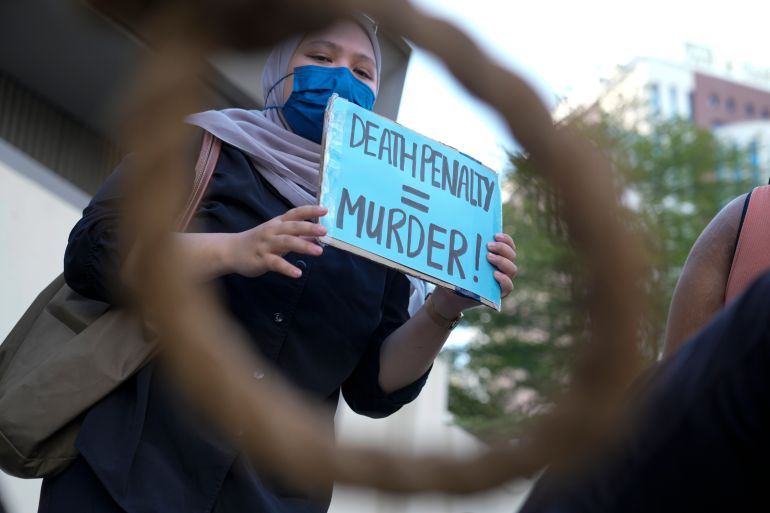Recorded executions rise to highest in five years: Amnesty
In annual report, rights group says ‘killing spree’ was led by countries in the Middle East and North Africa.

Some 883 people were executed last year, the highest number of known executions in five years, according to Amnesty International, which also raised concerns about the use of the death penalty for drug offences.
The number of executions, which does not include the thousands thought to have been carried out in China, increased by more than 50 percent compared with 2021, Amnesty said on Tuesday in its annual report on the use of the death penalty.
Keep reading
list of 4 itemsIran executes Swedish-Iranian dual national
US court halts execution of man who received ‘unfair’ trial
Myanmar military commutes 38 death sentences as part of amnesty
Some 90 percent of the world’s known executions outside China were carried out in just three countries in the Middle East and North Africa, the rights group said.
Iran executed 576 people last year (314 in 2021), Saudi Arabia 196 people (65 in 2021), and Egypt 24 people.
Amnesty noted that the executions in Saudi Arabia were the highest recorded in 30 years.
“Countries in the Middle East and North Africa region violated international law as they ramped up executions in 2022, revealing a callous disregard for human life,” Agnès Callamard, Amnesty International’s secretary general, said in a statement.
“The number of individuals deprived of their lives rose dramatically across the region; Saudi Arabia executed a staggering 81 people in a single day. Most recently, in a desperate attempt to end the popular uprising, Iran executed people simply for exercising their right to protest.”
In total, 20 countries were known to have used the death penalty last year, with five countries resuming executions, including Myanmar’s military regime shocking the world last July by hanging four of its political opponents in the first executions since the 1980s.
Amnesty noted that close to 40 percent of all the executions carried out last year were for drug-related offences and took place in Iran (255), Saudi Arabia (57), and Singapore (11). People were probably also executed for drug crimes in China and Vietnam, where the use of the death penalty remains a state secret, it added.
Under international human rights law, those countries that retain the death penalty are supposed to use it only for ‘the most serious crimes‘ that involve intentional killing.
“It’s time for governments and the UN to up the pressure on those responsible for these blatant human rights violations and ensure international safeguards are put in place,” Callamard said.
Still, while executions increased, the number of recorded death sentences imposed fell by 2 percent last year to 2,016.
Six countries — Kazakhstan, Papua New Guinea, Sierra Leone, the Central African Republic, Equatorial Guinea and Zambia — abolished the death penalty either fully or partially.
Liberia and Ghana took legislative steps towards abolishing the death penalty, while the authorities of Sri Lanka and the Maldives said they would not resort to implementing death sentences.
Malaysia also moved to abolish the mandatory death penalty.
“As many countries continue to consign the death penalty to the dustbin of history, it’s time for others to follow suit. The brutal actions of countries such as Iran, Saudi Arabia as well as China, North Korea and Viet Nam are now firmly in the minority. These countries should urgently catch up with the times, protect human rights, and execute justice rather than people,” Callamard said.